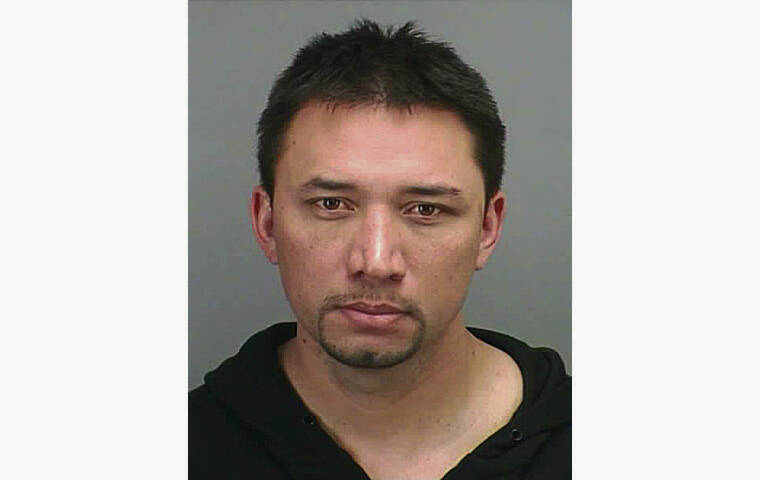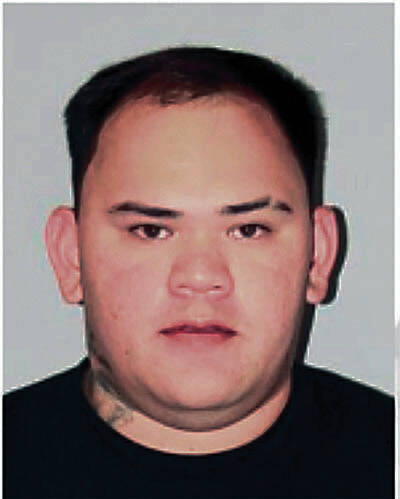Alleged Hawaii crime lord Michael J. Miske Jr. will stand trial alone after the last of his alleged co-conspirators entered into a plea agreement with the U.S. Department of Justice.
On Saturday, John B. Stancil, Miske’s 36-year-old half brother, agreed to waive indictment and enter a voluntary plea of guilty to the information, which charges him with conspiring to violate U.S. racketeering laws. Stancil entered his guilty plea Monday.
The plea agreement was filed two days before Miske’s trial began Monday before Chief U.S. District Court Judge Derrick K. Watson. Miske’s trial is expected to last months.
“The defendant used fear, violence and intimidation to get what he wanted,” Assistant U.S. Attorney William Akina said in his opening statement. “What he wanted was money, control and revenge.”
Miske’s attorney, Michael Kennedy, painted a completely different picture of his client.
Miske, 49, wasn’t a crime lord, but rather a “self-made man” who, despite growing up “on the wrong side of the tracks,” successfully built a family business called Kama‘aina Termite and Pest Control, Kennedy said in his opening statement.
The company saved iconic Hawaii structures and “cultural treasures,” including outdoor theater the Waikiki Shell, Iolani Palace and the Polynesian Cultural Center, Kennedy said. Miske even fumigated a Honolulu concert hall for free after the city couldn’t afford the $200,000 estimate, Kennedy said.
Akina alleged that Miske also owned several nightclubs where disputes over bar tabs would be met with physical assault from his “thugs.” In addition, he made millions selling illegal commercial-grade aerial fireworks on the black market, Akina said.
The businessman also groomed people from his Waimanalo neighborhood to violently rob drug dealers and carry out other orders, the prosecutor said.
Akina said Miske ordered hits on people, and though many were never carried out, at least one was: the 2016 killing of Johnathan Fraser, best friend to Miske’s only son, Caleb. Miske had long thought Fraser was a bad influence on his son, and blamed Fraser when the friends got into a car crash in 2015 that led to Caleb’s death, Akina said.
“There could be only one price to pay for the death of the defendant’s son,” Akina said. “A life for a life.”
An indictment alleges that Miske purchased a boat to dump Fraser’s body into the ocean, though the body has never been found.
Kennedy told jurors Monday that Miske didn’t blame Fraser for the crash and had nothing to do with his disappearance.
The people who will testify against Miske have something to gain from authorities, Kennedy said, referring to plea deals made by his alleged associates.
“Lies are going to rain down into this courtroom from that stand,” he said.
Testimony is scheduled to begin today.
Miske, Stancil, Dae Han Moon, Preston M. Kimoto, Miske’s daughter-in-law Delia-Anne Fabro-Miske, Jarrin Young and Jason K. Yokoyama were originally indicted in 2020 Opens in a new tab.
Everyone but Miske accepted a plea deal Opens in a new tab from federal prosecutors in exchange for their cooperation.
Stancil’s attorneys, Walter J. Rodby and Caroline M. Elliot, did not immediately reply to a Honolulu Star-Advertiser request for comment.
The “Miske Enterprise” is accused of murder for hire; the use of chemical weapons; extortionate credit transactions; racketeering; interference with commerce through robbery and extortion; methamphetamine, cocaine and cannabis trafficking; wire fraud; fraud in connection with identification documents; financial institution fraud; violations of the Currency and Foreign Transactions Reporting Act; money laundering; and obstruction of justice.
At sentencing, Stancil faces up to 20 years in prison and a fine of up to $250,000, plus three years of federal probation and a $100 special assessment.
From 2012 through June 2020, Stancil admitted to being a member of the Miske Enterprise.
Miske allegedly used “his power over members and associates of the Miske Enterprise, his reputation for violence in the community, and the various corporate entities under his control to enrich the members and associates of the Miske Enterprise and to embolden their criminal activities.”
As part of the plea agreement, Stancil admitted to his role in two chemical attacks on two Honolulu nightclubs on consecutive days in March 2017, according to federal court documents.
Stancil, acting on Miske’s orders, gave chloropicrin, which is “capable of causing death, temporary incapacitation, or permanent harm to humans,” to a driver along with instructions on how to use it.
Stancil drew on his experience from a chemical attack Miske ordered on a Waikiki club in 2015, according to the plea agreement.
In March 2017 an Oahu nightclub was attacked on back-to-back nights, and the release of the “chloropicrin resulted in nightclub patrons scrambling for the exits as they experienced burning in their eyes and difficulty breathing.”
Stancil also admitted his role in setting up a $60,000 murder-for-hire contract in 2016.
“Miske put the murder contract on Victim #1 because Miske believed Victim #1 had cooperated with law enforcement and provided information about Miske’s criminal activities,” read the plea agreement.
Miske asked to meet with the contract killers at the Kamehameha Shopping Center in Kalihi. The hit was supposed to go down in Waimanalo, but “Victim 1” never showed after several hours and was never killed.
Stancil also admitted he helped set up a contract so a man “could be on call and available to commit nonfatal acts of violence whenever Miske called.”
Stancil admitted to being the driver in a 2015 and 2016 assault of two men who were bidding against Miske at a car auction. One assault took place in a Wendy’s parking lot.
———
The Associated Press contributed to this report.






